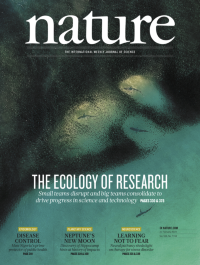Small pond big fish splash up storm
Big pond small fish group together
Volume 566 Issue 7744, 21 February 2019
The ecology of research
The ecosystem of research is evolving. In many areas of science and technology large teams are on the rise, and this collaborative approach has helped to drive advances that would otherwise have been difficult to realize. But questions remain over how big teams operate compared with smaller set-ups.
In this issue, James Evans and his colleagues reveal that small and large teams tend to occupy different niches in the landscape of research and development. The researchers analysed more than 65 million papers, patents and software products for the period 1954–2014, assessing to what extent a paper or product is viewed as a new direction or a refinement of prior work.
They found that smaller teams (represented on the cover by the handful of sharks) are more likely to disrupt science and technology with new ideas, designs and approaches. By contrast larger teams tend to school together (the smaller fish), consolidating and developing existing ideas. The researchers suggest that both approaches are required to sustain innovation and preserve a healthy ecosystem for science and technology to flourish.
Cover image: Visual Collective/Shutterstock
